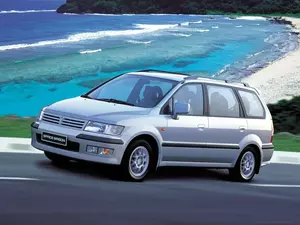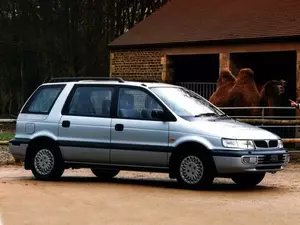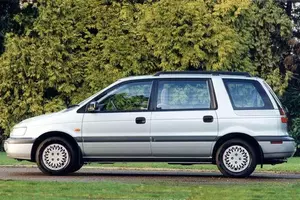
| Vehicle | Curb weight | Difference from world's smallest | Weight to power ratio | 0—60 mph acceleration ratio | Consumption ratio |
|---|---|---|---|---|---|
| 2.4 GDi 16V |
1585 kg / 3495 lbs |
1160 kg (2558 lbs) heavier | 11 kg to 1 hp | 147 kg/s (324 lbs/s) |
165 kg/L (364 lbs/L) |
| 2.4 GDi 16V 4X4 |
1685 kg / 3715 lbs |
1260 kg (2778 lbs) heavier | 11 kg to 1 hp | 143 kg/s (315 lbs/s) |
164 kg/L (362 lbs/L) |
| 2.4 GDi |
1510 kg / 3330 lbs |
1085 kg (2393 lbs) heavier | 9 kg to 1 hp | - | - |
| 2.0 i 16V |
1475 kg / 3252 lbs |
1050 kg (2315 lbs) heavier | 11 kg to 1 hp | 129 kg/s (284 lbs/s) | - |
| 3.0 GDi 24V |
1640 kg / 3616 lbs |
1215 kg (2679 lbs) heavier | 8 kg to 1 hp | - | - |
| 3.0 GDi 24V 4X4 |
1720 kg / 3793 lbs |
1295 kg (2856 lbs) heavier | 8 kg to 1 hp | - | - |
| Vehicle | 2.4 GDi 16V |
|---|---|
| Curb weight |
1585 kg / 3495 lbs |
| Difference from world's smallest | 1160 kg (1160 lbs) heavier |
| Weight to power ratio | 11 kg to 1 hp |
| 0—60 mph acceleration ratio | 147 kg/s (324 lbs/s) |
| Consumption ratio |
165 kg/L (364 lbs/L) |
| Vehicle | 2.4 GDi 16V 4X4 |
| Curb weight |
1685 kg / 3715 lbs |
| Difference from world's smallest | 1260 kg (1260 lbs) heavier |
| Weight to power ratio | 11 kg to 1 hp |
| 0—60 mph acceleration ratio | 143 kg/s (315 lbs/s) |
| Consumption ratio |
164 kg/L (362 lbs/L) |
| Vehicle | 2.4 GDi |
| Curb weight |
1510 kg / 3330 lbs |
| Difference from world's smallest | 1085 kg (1085 lbs) heavier |
| Weight to power ratio | 9 kg to 1 hp |
| 0—60 mph acceleration ratio | - |
| Consumption ratio | - |
| Vehicle | 2.0 i 16V |
| Curb weight |
1475 kg / 3252 lbs |
| Difference from world's smallest | 1050 kg (1050 lbs) heavier |
| Weight to power ratio | 11 kg to 1 hp |
| 0—60 mph acceleration ratio | 129 kg/s (284 lbs/s) |
| Consumption ratio | - |
| Vehicle | 3.0 GDi 24V |
| Curb weight |
1640 kg / 3616 lbs |
| Difference from world's smallest | 1215 kg (1215 lbs) heavier |
| Weight to power ratio | 8 kg to 1 hp |
| 0—60 mph acceleration ratio | - |
| Consumption ratio | - |
| Vehicle | 3.0 GDi 24V 4X4 |
| Curb weight |
1720 kg / 3793 lbs |
| Difference from world's smallest | 1295 kg (1295 lbs) heavier |
| Weight to power ratio | 8 kg to 1 hp |
| 0—60 mph acceleration ratio | - |
| Consumption ratio | - |

| Vehicle | Curb weight | Difference from world's smallest | Weight to power ratio | 0—60 mph acceleration ratio | Consumption ratio |
|---|---|---|---|---|---|
| 2.4 GDI |
1510 kg / 3330 lbs |
1085 kg (2393 lbs) heavier | 10 kg to 1 hp | 159 kg/s (351 lbs/s) | - |
| 2.4 GDI 4x4 |
1610 kg / 3550 lbs |
1185 kg (2613 lbs) heavier | 11 kg to 1 hp | 153 kg/s (337 lbs/s) | - |
| Vehicle | 2.4 GDI |
|---|---|
| Curb weight |
1510 kg / 3330 lbs |
| Difference from world's smallest | 1085 kg (1085 lbs) heavier |
| Weight to power ratio | 10 kg to 1 hp |
| 0—60 mph acceleration ratio | 159 kg/s (351 lbs/s) |
| Consumption ratio | - |
| Vehicle | 2.4 GDI 4x4 |
| Curb weight |
1610 kg / 3550 lbs |
| Difference from world's smallest | 1185 kg (1185 lbs) heavier |
| Weight to power ratio | 11 kg to 1 hp |
| 0—60 mph acceleration ratio | 153 kg/s (337 lbs/s) |
| Consumption ratio | - |

| Vehicle | Curb weight | Difference from world's smallest | Weight to power ratio | 0—60 mph acceleration ratio | Consumption ratio |
|---|---|---|---|---|---|
| 2.0 GLXi 4x4 |
1436 kg / 3166 lbs |
1011 kg (2229 lbs) heavier | 11 kg to 1 hp | 125 kg/s (276 lbs/s) |
145 kg/L (320 lbs/L) |
| 2.0 GLXi |
1351 kg / 2979 lbs |
926 kg (2042 lbs) heavier | 10 kg to 1 hp | 127 kg/s (280 lbs/s) |
148 kg/L (326 lbs/L) |
| Vehicle | 2.0 GLXi 4x4 |
|---|---|
| Curb weight |
1436 kg / 3166 lbs |
| Difference from world's smallest | 1011 kg (1011 lbs) heavier |
| Weight to power ratio | 11 kg to 1 hp |
| 0—60 mph acceleration ratio | 125 kg/s (276 lbs/s) |
| Consumption ratio |
145 kg/L (320 lbs/L) |
| Vehicle | 2.0 GLXi |
| Curb weight |
1351 kg / 2979 lbs |
| Difference from world's smallest | 926 kg (926 lbs) heavier |
| Weight to power ratio | 10 kg to 1 hp |
| 0—60 mph acceleration ratio | 127 kg/s (280 lbs/s) |
| Consumption ratio |
148 kg/L (326 lbs/L) |